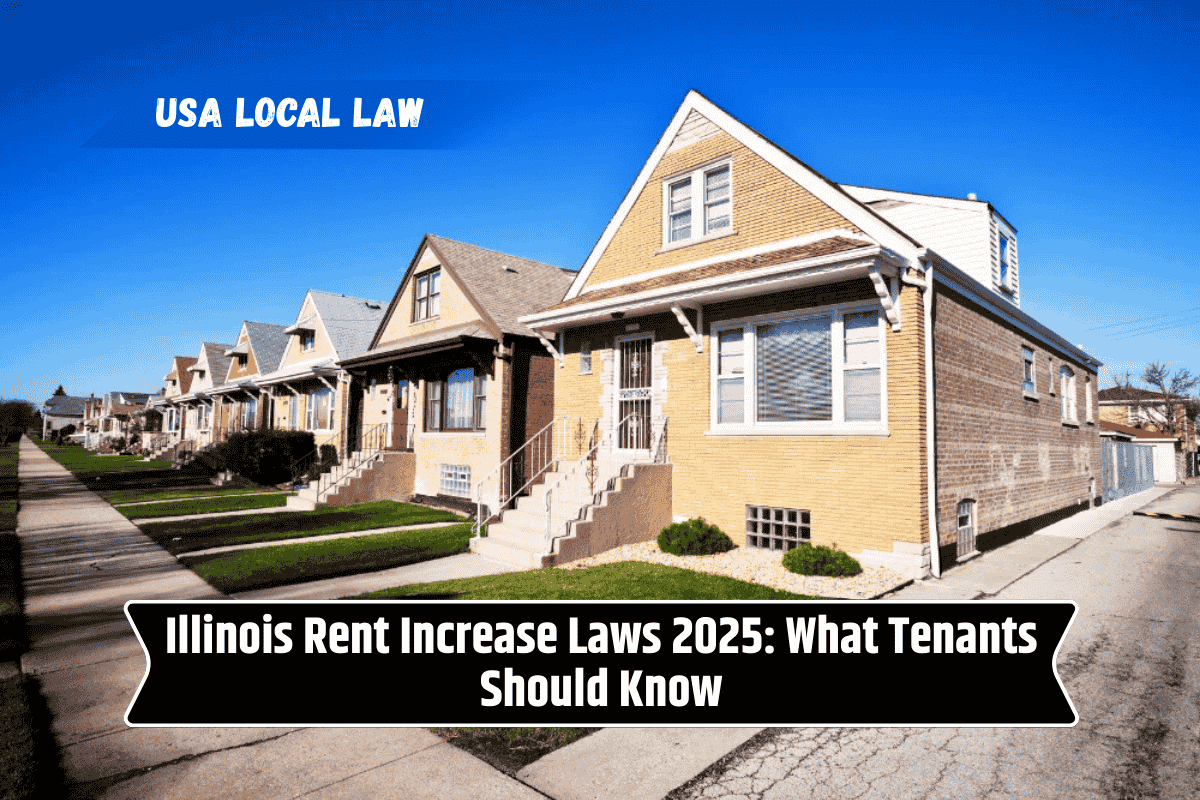Renting a home or apartment can be stressful—especially when the landlord suddenly raises the rent. In Illinois, new updates to rent increase laws in 2025 aim to create more clarity and fairness between landlords and tenants. Whether you’re renting in Chicago or a smaller town, it’s important to understand your rights.
This guide will help you learn about Illinois rent increase rules, how much notice your landlord must give, limits on how often rent can be raised, and what to do if you think the increase is unfair.
Does Illinois Have Statewide Rent Control?
No, Illinois does not have a statewide rent control law. This means there is no set limit on how much a landlord can raise the rent. However, cities like Chicago have their own tenant protection rules, and the new updates in 2025 are aimed at giving renters more time to prepare when their rent goes up.
New 2025 Rule: 60-Day Notice for Rent Increases
One of the most important changes in 2025 is the required notice period before a landlord can increase your rent. Now, landlords must give tenants a written notice at least:
30 days in advance if you’ve lived there for less than 6 months
60 days in advance if you’ve lived there between 6 months and 3 years
120 days in advance if you’ve lived in the unit for more than 3 years
This new rule is part of Illinois’ effort to give tenants enough time to adjust their budget or find a new place if the rent becomes too high.
How Often Can Rent Be Increased?
In most parts of Illinois, landlords can increase rent once per lease term, usually once a year, unless the lease says otherwise. For month-to-month renters, the landlord can raise the rent with proper notice and in line with the updated notice laws.
However, landlords cannot raise the rent during a fixed lease (like a 12-month lease) unless that lease allows increases. Always read your lease carefully.
Are There Any Rent Increase Limits?
Since Illinois does not have rent control, there is no specific limit on how high rent can be raised. That means landlords can raise rent by any amount—unless it’s clearly done in a way that discriminates or retaliates against a tenant.
In some cities or counties, especially in Chicago, there may be local tenant rights groups pushing for limits or fairness rules. Tenants should check with their city’s housing department for local protections.
What If I Think the Rent Increase Is Unfair?
If you believe a rent increase is too high, unfair, or possibly illegal, you can:
Talk to your landlord: Sometimes landlords are open to negotiating.
Check your lease: Make sure the rent increase follows the rules stated in the lease.
Seek legal help: Contact a local tenant union or housing attorney if you feel you are being treated unfairly.
File a complaint: If you suspect discrimination or retaliation (such as your rent being raised after you made a complaint), you can report it to the Illinois Department of Human Rights or a local housing authority.
Does This Apply to All Rental Properties?
These laws apply to most standard rental units like apartments, duplexes, and houses. But there may be exceptions for:
Subsidized housing (such as Section 8)
Senior housing
Short-term vacation rentals
Different rules may apply to these types of housing, so it’s always a good idea to ask questions or seek advice if you’re unsure.
Tips for Tenants in 2025
Keep a copy of your lease and all written communication with your landlord.
Pay rent on time to avoid issues when renewing your lease.
Know your rights under both state and local laws.
Don’t sign a lease without reading it carefully.
If the rent increase feels extreme, don’t be afraid to ask for help or advice.
The 2025 updates to Illinois rent increase laws focus on giving renters more time and notice before a rent hike. While Illinois does not have rent control, the new notice rules make sure tenants have a fair warning and can prepare in advance.
Knowing your rights and checking your lease carefully can help you avoid surprises and protect your home. If something doesn’t feel right, don’t hesitate to ask questions or get legal advice. Renters have more power than they often realise—especially when they know the law.
